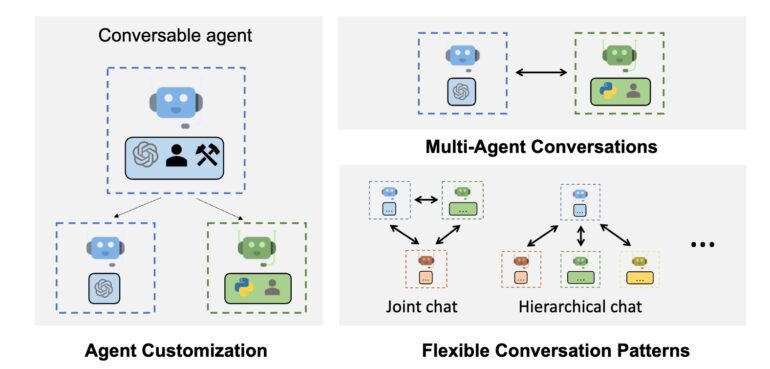TL;DR:
- Microsoft introduces AutoGen framework for LLM applications with multi-agent conversational capabilities.
- Developed in collaboration with top-tier universities, AutoGen revolutionizes AI development on Github.
- AutoGen streamlines complex LLM workflows, boosting performance and overcoming inherent limitations.
- Customizable conversation patterns and extensive adaptability set AutoGen apart from other frameworks.
- AutoGen offers practical applications in diverse fields, from customer service to healthcare and education.
- Key agents: AssistantAgent for automated task solving and UserProxyAgent for human interaction.
- AutoGen enhances LLM capabilities, serving as a versatile drop-in replacement for openai.Completion.
- Automation of tasks among agents expands its utility, especially for tool-based operations.
- Microsoft’s open-sourcing of AutoGen democratizes access to advanced AI tools and fosters collaboration.
Main AI News:
In a strategic move that has sent ripples through the artificial intelligence (AI) community, Microsoft has quietly unveiled AutoGen, a groundbreaking framework designed to empower the development of large language model (LLM) applications. AutoGen introduces the concept of multi-agent conversations, enabling seamless interactions among AI agents, human input, and tools, ultimately enhancing problem-solving capabilities.
In collaboration with prestigious institutions like Penn State University and the University of Washington, Microsoft has leveraged its expertise to create AutoGen. This innovative framework is now accessible on Github, marking a pivotal moment in the AI landscape and offering new avenues of exploration for both developers and researchers.
AutoGen’s significance lies in its ability to streamline the development of next-generation LLM applications, making multi-agent conversations effortlessly attainable. This orchestration of multiple agents promises to automate and optimize complex LLM workflows, thereby maximizing their performance while mitigating their inherent weaknesses.
A standout feature of AutoGen is its support for diverse conversation patterns, granting developers the freedom to craft a wide array of interaction styles. This adaptability extends to conversation autonomy, agent count, and conversation topology—a level of customization and interaction unparalleled in other frameworks.
Furthermore, AutoGen showcases its versatility through a collection of functional systems, each varying in complexity and spanning diverse domains. From customer service to healthcare, education, and beyond, AutoGen’s adaptability holds immense potential for a wide range of applications.
Key Agents in Action:
- AssistantAgent: This AI assistant operates seamlessly using LLMs, capable of generating Python code and even suggesting bug fixes. It requires no human input or code execution and can be tailored to specific tasks.
- UserProxyAgent: Designed as a proxy agent for humans, this agent seeks human input as its default response. It also possesses the ability to execute code and call functions, automatically triggering code execution when a code block is detected in the message.
From a technical perspective, AutoGen serves as a drop-in replacement for openai.Completion or openai.ChatCompletion, offering an enhanced inference API. This facilitates performance tuning, API unification, caching, error handling, and advanced usage patterns, significantly enhancing the capabilities of LLMs like ChatGPT and GPT-4.
AutoGen’s true power emerges in its ability to automate collective tasks among capable agents, whether autonomously or with human guidance. This extends to tasks that necessitate tool utilization through code, expanding the tool’s potential applications.
Microsoft’s release of AutoGen represents a monumental step forward in AI technology. By open-sourcing this tool on Github, Microsoft not only democratizes access to cutting-edge AI resources but also fosters a collaborative ecosystem where developers and researchers can contribute to its evolution.
Conclusion:
Microsoft’s AutoGen heralds a new era in AI development, offering unparalleled multi-agent conversational abilities and adaptability. This innovation holds the potential to reshape the AI market, empowering developers and researchers to explore diverse applications and collaborate in a dynamic ecosystem.

